June 2023 marked the 25th Anniversary of Gramercy! Thank you to our valued investors, trusted business partners and team members without whom this milestone could not have been reached. We are excited for the opportunities we see ahead, and look forward to continuing to deliver upon our mission to have a positive impact on the well-being of our clients, portfolio investments (and their communities) and our team members.
Contents
Market Overview
Macro Review
Mixed U.S. data still supports a soft-landing scenario. U.S. retail sales missed expectations even as PPI was on the higher side. The latter triggered higher U.S. Treasury yields where half of the sell-off YTD in yields has come in the past week. This coincides with crude oil at its highest level since November, after gold and bitcoin reach all-time highs. The angst in the U.S. Treasury market was initially caused by a weak 10-year auction after revisions to non-farm payroll data last Friday, but ultimately supported by the strongest 30-year auction in some time. We have witnessed USD strength of late, but with EURAUD weakness, there is a strong correlation into EMFX that has helped EM local currency indices rally. Across EM we have seen Chinese CPI inflation came in hotter than expectations at 0.7%, but PPI was down 2.7%. Yet, the focus was Chinese new home prices that slid sharply by 1.4% in February, marking the steepest drop in 13 months. Thailand’s Prime Minister is due to relinquish his role as Finance Minister with a market friendly appointment, which could ease political pressure on the Central Bank to cut rates. There is growing optimism of a new IMF deal for Argentina and a new money solution, just as inflation came in lower than expectations and Finance Minister Caputo successfully refinanced its bond swap. The IMF mission to Pakistan concluded with hopes that the last tranche of the $3bn Stand-By Arrangement will soon to be disbursed, but there is growing anticipation of a larger package. Finally, we had the first official polls ahead of the Panama and South African elections. In Panama, Jose Mulino leads in the Presidential race after previous candidate Ricardo Martinelli was banned from candidacy. An unconstitutional demand over Mulino’s candidacy was also presented to the Supreme Court. South Africa’s incumbent ANC are polling at 39%, while Jacob Zuma’s new party may be able to pick up 13% of the vote and play an important role in the coalition. It remains too early to assess the strength of Zuma’s uMkhonto weSizwe party (translated as “Spear the Nation”).
EM Credit Update
Emerging market sovereign credit (cash bonds) ended the week down 0.6% with credit spreads 11bps tighter. Sovereign outperformers were Zambia, Sri Lanka and Ghana, while Ukraine, Egypt and El Salvador underperformed. Key events across EM corporate credit saw (1) Mexico’s Cemex upgraded to investment grade for the first time since 2009; (2) China’s Country Garden missed a coupon payment on a yuan bond for the first time; and (3) China’s Vanke is undergoing discussions with banks regarding a debt swap that would help delay its first bond default.
The Week Ahead
The major macro events of next week include the Federal Reserve, Bank of Japan, Reserve Bank of Australia and Bank of England interest rate decisions. The wildcard is whether Japan exits NIRP (negative interest rate policy), but other DM central banks are expected to keep rates unchanged. The same is true from China’s PBoC with the upcoming one-year and five-year loan prime rate decisions, with some emphasis on retail sales and FAI growth. Other EM interest rate decisions cover Czech Republic (6.25%), Indonesia (6.0%), Taiwan (1.875%) and Turkey (45%). Russia’s election will take place while others celebrate St Patrick’s Day, with some focus on Indian Wells in California and NCAA college basketball.
Highlights from emerging markets discussed below: Turkey begins tightening credit card conditions earlier than expected; Pakistan appoints market friendly Finance Minister while IMF visit gets underway; and Argentina inflation print better than expected while rate cuts and political noise continue.
Fixed Income
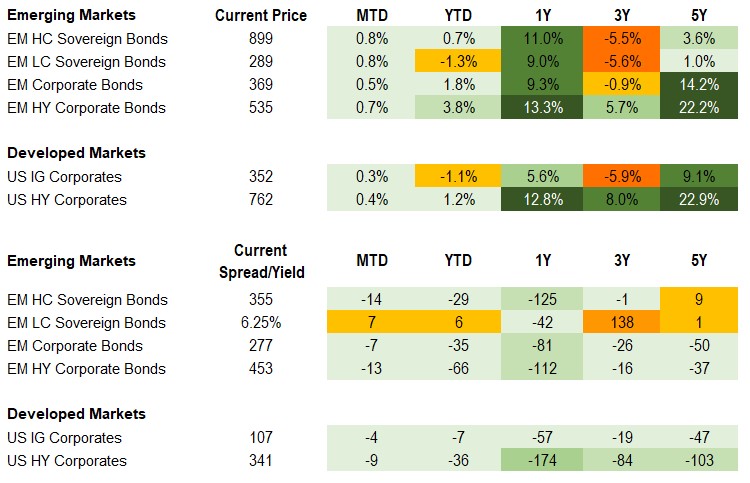
Equities
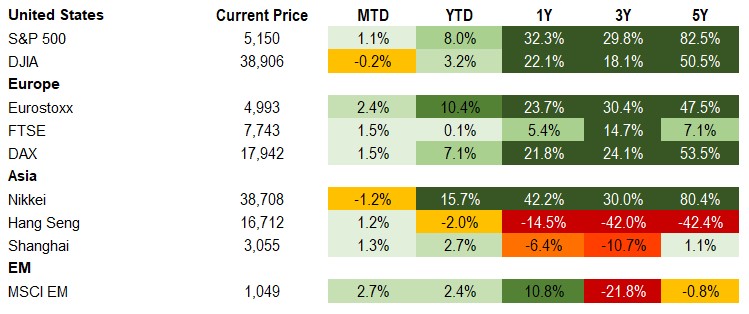
Commodities

Source for data tables: Bloomberg, JPMorgan, Gramercy. EM Fixed Income is represented by the following JPMorgan Indicies: EMBI Global, GBI-EM Global Diversified, CEMBI Broad Diversified and CEMBI Broad High Yield. DM Fixed Income is represented by the JPMorgan JULI Total Return Index and Domestic High Yield Index. Fixed Income, Equity and Commodity data is as of March 15, 2024 (mid-afternoon).
Emerging Markets Weekly Highlights
Turkey begins tightening credit card conditions earlier than expected
Event: It was reported this week that Turkish banks have started to tighten certain non-interest rate conditions on retail credit cards such as capping cash withdrawals at 25% of the card limit and eliminating additional installment options on top of installment plans offered by vendors.
Gramercy Commentary: Although not a high-profile news item, this is an important development in Turkey’s fight against inflation as credit card spending growth has remained strong in recent months and represents one of the main challenges in tightening onshore financial conditions. Given the social sensitivity of any demand-curbing measures ahead of the important local elections on March 31st, it is a positive surprise from a market perspective that such steps are being taken before the vote, which likely reflects increased concerns locally in recent weeks about the disinflation path. We expect more forceful measures aimed at reducing credit card spending and cooling domestic demand to be taken after the elections, which will likely include a significant increase in the interest rates charged by banks on credit card balances. We note that once the upcoming local elections are out of the way, Turkey will enjoy a rare period of four years (until June 2028) without elections of any kind, which we expect will allow Finance Minister Mehmet Simsek’s economic team more space to continue implementing a comprehensive macroeconomic adjustment program to correct the imbalances inherited from the pre-June 2023 economic policy regime.
Pakistan appoints market friendly Finance Minister while IMF visit gets underway
Event: On March 11th, Prime Minister Shehbaz Sharif appointed his cabinet including former banker Muhammad Aurangzeb as Finance Minister. Former Finance Minister Ishaq Dar will take on the Foreign Minister post where he will focus on securing investments from regional partners. Aurangzeb holds an MBA from Wharton and was most recently CEO of Pakistan’s largest bank, HBL, and previously CEO of JP Morgan’s Global Corporate Bank in Asia. On Thursday, an IMF staff visit commenced for the final review under the country’s existing Stand-By Arrangement (SBA) as well as potential initial discussions on a new Extended Fund Facility (EFF) program.
Gramercy Commentary: We see Aurangzeb’s role as Finance Minister as constructive particularly for upcoming negotiations on a likely new longer and larger IMF facility. We anticipate an understanding and willingness on his part to commit to necessary fiscal reforms. Dar’s continued presence and focus on external investment offers a degree of continuity and leaves open the possibility for a larger all-in new financing package including regional and other multilateral lenders. While we expect the final review under the SBA and associated $1.1bn disbursement to be completed relatively swiftly, talks over a new EFF could take a bit longer.
Argentina inflation print better than expected while rate cuts and political noise continue
Event: February monthly inflation eased to 13.2% m/m (180bps below consensus) from 20.6% m/m in January. Annual inflation continued to accelerate to 276% y/y but was also better than market estimates. The Central Bank of Argentina (BCRA) lowered its policy rate to 80% from 100% while the government swapped 77% of its peso debt maturing in 2024 (~$40bn) for new CPI-linked debt due between 2025 and 2028. S&P lowered its ratings on Argentine local debt to selective default (SD) on the transaction as it has done during similar exercises in 2023. Later in the week, the Senate voted against Milei’s mega decree initiated in December 2023 amid growing speculation of heightened tensions between Milei and Vice President Victoria Villarruel.
Gramercy Commentary: The swifter than expected decline in monthly inflation rates thus far bodes well for Milei and is a supportive indicator of successful execution of the short-term stabilization plan and ‘shock therapy’ policies. However, inflation remains extremely high and will need to continue to fall swiftly for Milei to sustain popularity and further his agenda. The authorities are likely aiming to further reduce Central Bank liabilities with its continued rate cuts, but this remains a risky move given the current macro context. Pressure may start to rebuild on the blue-chip swap rate. Meanwhile, the vote against the decree in the Senate is yet another complication on the political front while negotiations over key aspects of a refined omnibus bill continue.
Emerging Markets Technicals
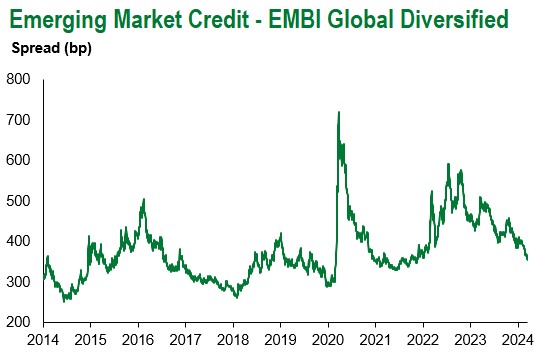
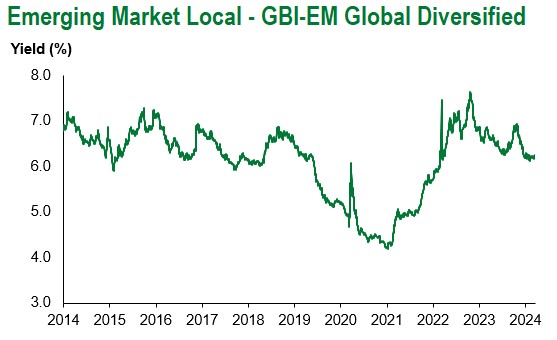
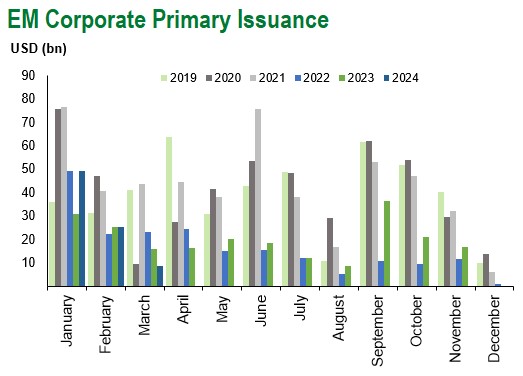
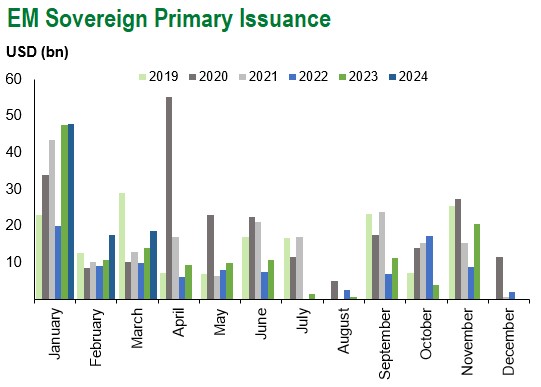
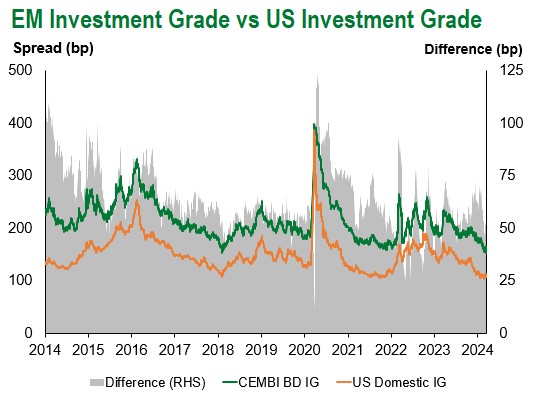
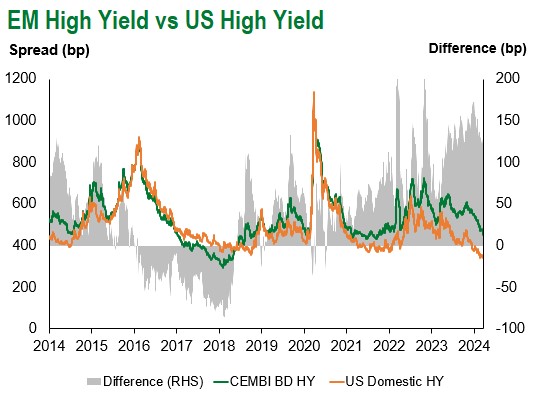
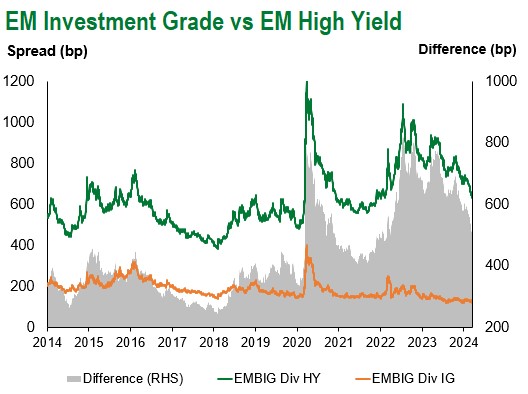
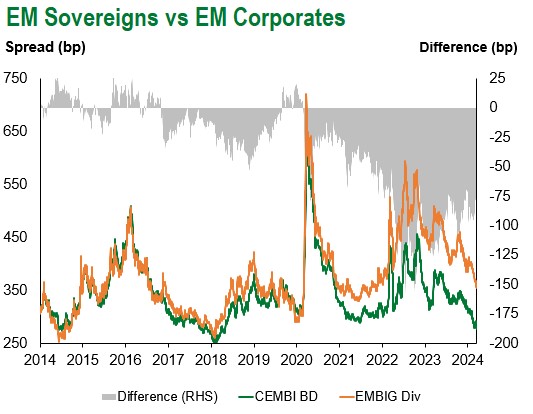
Emerging Markets Flows
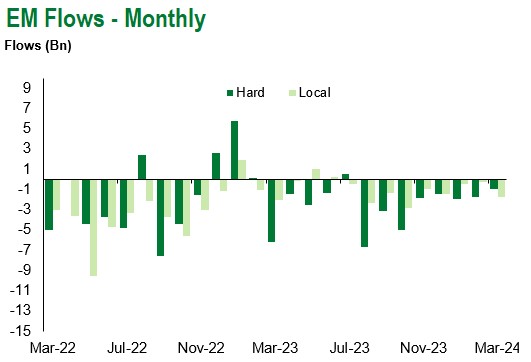
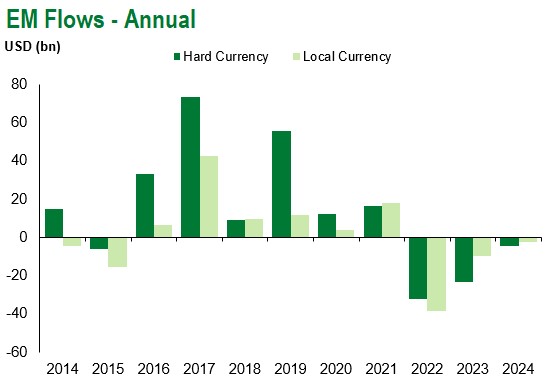
Source for graphs: Bloomberg, JPMorgan, Gramercy. As of March 15, 2024.
For questions, please contact:
Kathryn Exum, CFA ESG, Director, Co-Head of Sovereign Research, [email protected]
Petar Atanasov, Director, Co-Head of Sovereign Research, [email protected]
James Barry, Director, Deputy Portfolio Manager, [email protected]
This document is for informational purposes only. The information presented is not intended to be relied upon as a forecast, research or investment advice, and is not a recommendation, offer or solicitation to buy or sell any securities or to adopt any investment strategy. Gramercy may have current investment positions in the securities or sovereigns mentioned above. The information and opinions contained in this paper are as of the date of initial publication, derived from proprietary and nonproprietary sources deemed by Gramercy to be reliable, are not necessarily all-inclusive and are not guaranteed as to accuracy. This paper may contain “forward-looking” information that is not purely historical in nature. Such information may include, among other things, projections and forecasts. There is no guarantee that any forecasts made will come to pass. Reliance upon information in this paper is at the sole discretion of the reader. You should not rely on this presentation as the basis upon which to make an investment decision. Investment involves risk. There can be no assurance that investment objectives will be achieved. Investors must be prepared to bear the risk of a total loss of their investment. These risks are often heightened for investments in emerging/developing markets or smaller capital markets. International investing involves risks, including risks related to foreign currency, limited liquidity, less government regulation, and the possibility of substantial volatility due to adverse political, economic or other developments. References to any indices are for informational and general comparative purposes only. The performance data of various indices mentioned in this update are updated and released on a periodic basis before finalization. The performance data of various indices presented herein was current as of the date of the presentation. Please refer to data returns of the separate indices if you desire additional or updated information. Indices are unmanaged, and their performance results do not reflect the impact of fees, expenses, or taxes that may be incurred through an investment with Gramercy. Returns for indices assume dividend reinvestment. An investment cannot be made directly in an index. Accordingly, comparing results shown to those of such indices may be of limited use. The information provided herein is neither tax nor legal advice. Investors should speak to their tax professional for specific information regarding their tax situation.
